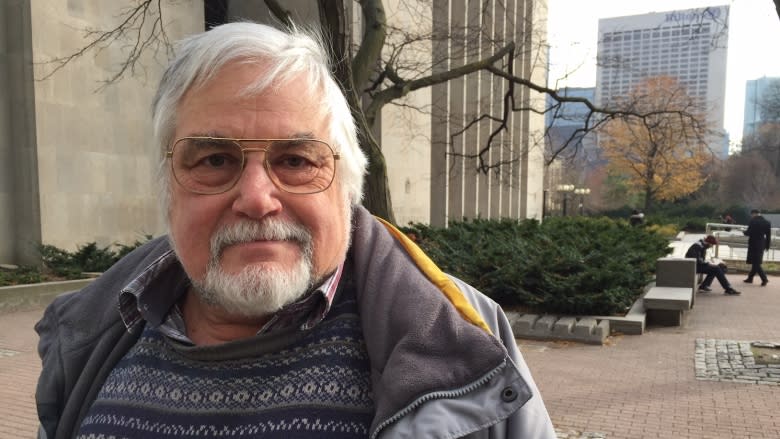The car he was driving killed a pedestrian — will he go to prison?
The fate of a young Toronto man who drove his car onto a sidewalk and killed a woman in 2015 is now in the hands of a judge.
Gideon Fekre, who was 18 at the time, is charged with dangerous operation of motor vehicle causing death. Closing arguments at his superior court trial concluded on Monday.
Justice Peter Bawden reserved his decision until 12 p.m. Tuesday.
On April 20, 2015, Kristy Hodgson was walking her two dogs on Dundas Street East near Carlaw Avenue when she was struck by Fekre's vehicle.
Hodgson, 31, worked in graphic design and film production and was described by her father as "the most wonderful person in the world.
"Everybody loved her," John Hodgson said in an interview.
The water bottle
One of Hodgson's dogs was also killed.
It was 2:12 p.m. when Fekre, driving his mother's black Honda Civic, left the eastbound Dundas lane, swerved across the bike lane, climbed the curb onto the sidewalk and struck Hodgson, before rear-ending a pickup truck and coming to a stop.
Fekre, who testified as a witness, said he was briefly distracted by a water bottle that had fallen on the floor of the car near the brake pedal. In what was described as a "reflex" reaction, Fekre looked down towards the bottle before returning his eyes to the road.
But by that time it was too late.
Whether or not Fekre killed Hodgson was not disputed at trial. The case boils down to whether Fekre taking his eyes off the road for moment constitutes a criminal act.
A person found guilty of dangerous driving causing death faces a maximum sentence of 14 years in prison.
John Hodgson believes causing his daughter's death deserves time behind bars.
"No question about it," he said. "If the guy gets off it means that it's ok to drive up on the sidewalk and kill people."
But many road fatalities do not lead to criminal charges, let alone a trial; attempts at justice come through Highway Traffic Act fines and license suspensions or civil compensation.
In his closing arguments on Monday, Fekre's lawyer, Jordan Gold, characterized his actions as a "momentary lapse in attention."
He likened it to tuning a car radio, reaching for a coffee cup or even checking the speedometer.
"We all do that," Gold argued. "He made his decision because he thought it was safe in the moment."
Fekre had no previous driving record, remained on the scene of the crash, where the court heard he expressed remorse, and fully cooperated with the police investigation.
But for the prosecution, Fekre's actions are "marked departure" from a common lapse in attention.
Crown attorney Scott Patterson argued that Fekre's "second of inattention" were not something expected by a reasonable driver.
He also questioned Fekre's testimony that taking his eyes off the road to look towards the floor was "reflex" reaction.
Patterson told the court that since Fekre said he contemplated the potential danger of the bottle rolling near the brake pedal, it was more of a conscious choice.
"Intentional inattention," Patterson called it, which occured on a busy Toronto street, and had catastrophic consequences.



